17 Top AI Courses for Microbiologists in 2025
Discover the 17 best AI courses for microbiologists in 2025, enhancing your skills in data analysis, machine learning, and cutting-edge research techniques. Stay ahead in your field with tailored programs designed to integrate AI into microbiological studies.
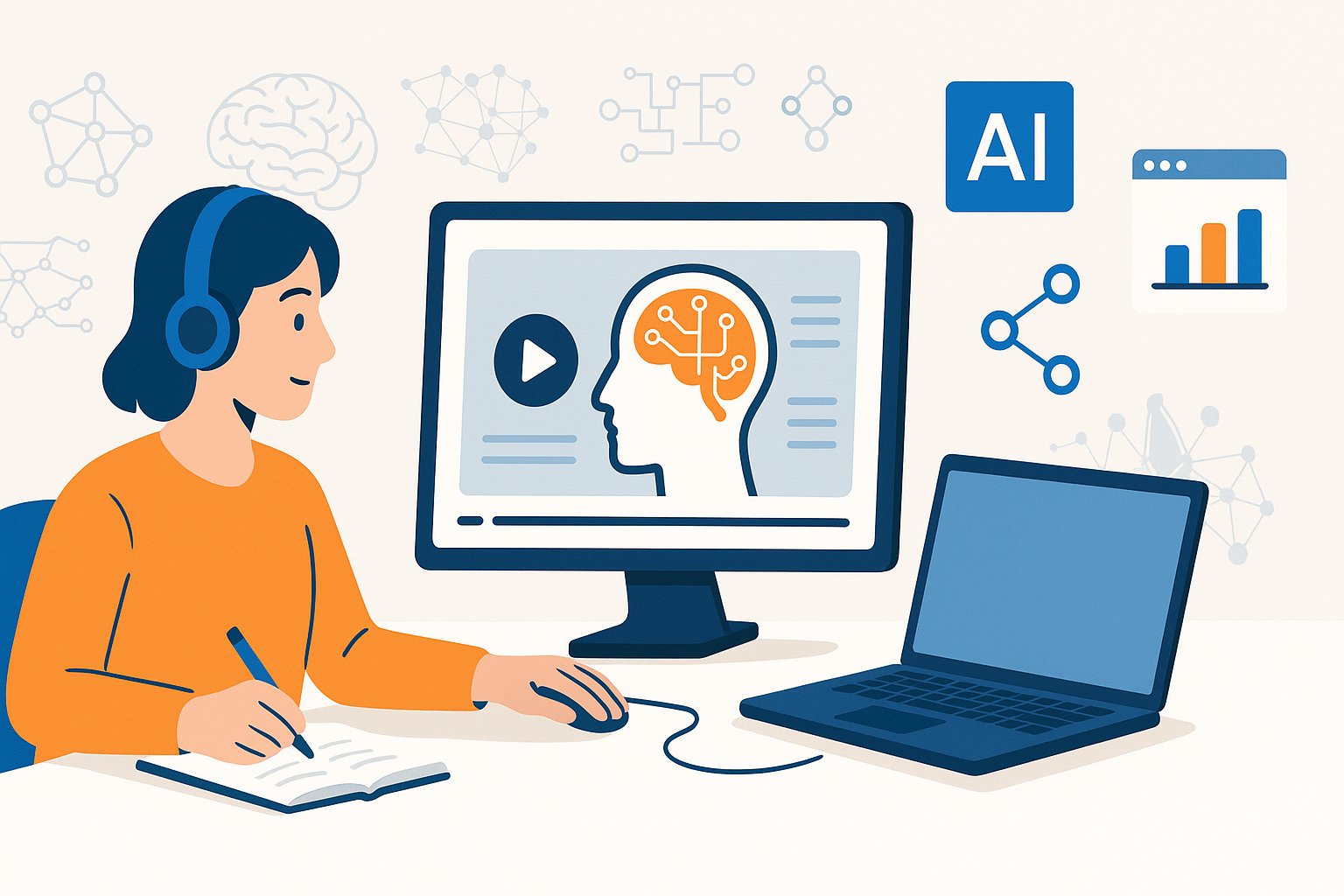
As the landscape of microbiology continues to evolve, the integration of artificial intelligence (AI) into various scientific domains becomes increasingly imperative. AI is not just a buzzword; it is a transformative force poised to redefine how microbiologists conduct research, analyze data, and make critical decisions. With the rapid advancement of AI technologies, professionals in the field must actively seek to enhance their skills and adapt to the changing demands of the industry. Upskilling with AI knowledge is no longer optional but a necessity to stay competitive and relevant in the workforce.
Why AI matters for Microbiologists today
AI is becoming a cornerstone of modern science, and its impact on microbiology is profound. According to recent statistics, 69% of businesses across various sectors are already utilizing AI to streamline operations and increase efficiency. For microbiologists, this trend signifies an urgent need to embrace AI tools and methodologies. The primary purpose of this article is to guide microbiology professionals in identifying the most effective AI courses that will equip them with the skills needed to excel in their field.
The Growing Role of AI in Microbiologists
AI applications in microbiology are diverse and growing. From automating routine tasks to aiding in complex decision-making processes, AI is enhancing productivity and precision. Key applications include:
- Automation of microbial culture techniques
- Enhanced decision-making in microbial genome analysis
- Personalized approaches to studying antibiotic resistance
- Streamlined processes for pathogen identification
- Optimized strategies for environmental microbial sampling
AI is reshaping traditional tasks and workflows, allowing microbiologists to focus on more strategic and innovative aspects of their research.
Benefits of becoming an AI expert in Microbiologists
For microbiologists, gaining expertise in AI offers numerous advantages. AI proficiency enables professionals to improve research accuracy, accelerate data analysis, and develop innovative solutions to complex biological challenges. By understanding AI tools, microbiologists can also enhance their ability to interpret large datasets, leading to more comprehensive insights and impactful scientific discoveries.
This article will explore and compare 17 AI courses tailored for microbiologists, including the highly regarded CompleteAI Training. These courses provide valuable education opportunities to help professionals stay at the forefront of their field and leverage AI for success in various areas such as clinical trial data analysis and infection control strategies.

Comparison: All AI Courses for Microbiologists (Updated Q2' 2025)
| Course Name | Provider | Price | Key Topics | Pros | Cons | Best For |
|---|---|---|---|---|---|---|
| AI for Microbiologists (Video Courses + Certifications) | Complete AI Training | $29/month (monthly), $8.25/month billed annually | Specialized video courses, AI education, AI tools updates, AI industry news | Highest rating, Extensive courses, Daily updates, Affordable pricing | Subscription based | Microbiologists professionals |
| AI & ChatGPT for Microbial Culture Techniques | Complete AI Training | Included with membership (free trial available) | Media preparation, sterilization, inoculation, automation, quality control | Comprehensive coverage, Practical applications | Requires membership | General learners |
| AI & ChatGPT for Microbial Genome Analysis | Complete AI Training | Included with membership | Genome data interpretation, AI tools | Tailored for microbiologists, Practical applications | Pricing details not specified | General learners |
| AI & ChatGPT for Antibiotic Resistance Studies | Complete AI Training | Included with membership | Antibiotic resistance patterns, AI tools | Practical focus, Beginner-friendly | Pricing not detailed | General learners |
| AI & ChatGPT for Pathogen Identification | Complete AI Training | Included with membership | Pathogen identification, Diagnostic workflows | Practical diagnostics, Updated content | No explicit pricing | General learners |
| AI & ChatGPT for Environmental Microbial Sampling | Complete AI Training | Included with membership | Microbial sampling strategies, Data analysis | Relevant to environmental microbiology, Practical integration | Pricing not disclosed | General learners |
| AI & ChatGPT for Fermentation Process Optimization | Complete AI Training | Included with membership | Fermentation processes, Efficiency improvement | Industry-relevant, Practical applications | No pricing information | General learners |
| AI Youth Camp 2025 , Bioinformatics Track | Calvin Institute of Technology | $200 (Basic), $235 (Intermediate) | Python for AI, Machine learning, Bioinformatics projects | Hands-on projects, Inclusive pricing | Age restriction, Location-specific | General learners |
Understanding AI Training for Microbiologists Professionals
The integration of artificial intelligence (AI) into the field of microbiology is accelerating, offering professionals innovative tools and methodologies to enhance research and operational efficiencies. For microbiologists keen on leveraging AI, an array of specialized courses is available, each catering to different aspects of microbiology. This article provides an objective comparison of various AI courses tailored for microbiologists, focusing on their content, audience, benefits, and potential drawbacks.
Course 1: CompleteAI Training
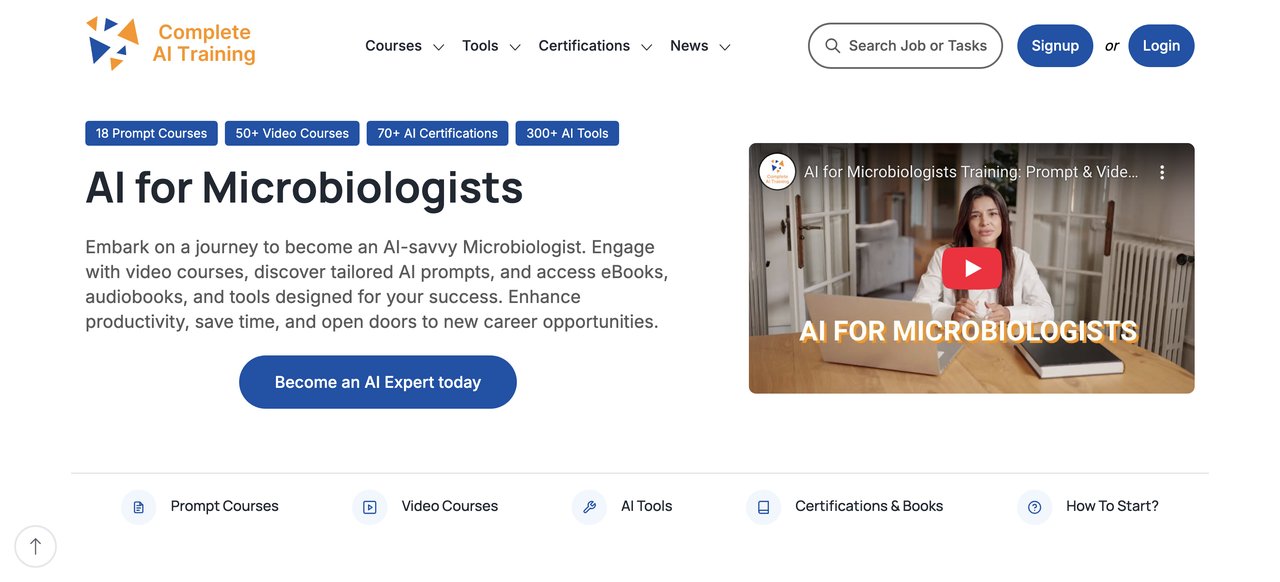
Complete AI Training offers an extensive library of over 100 video courses and certifications explicitly designed for microbiologists. This comprehensive platform provides continuous updates on AI tools and news pertinent to the field, making it a valuable resource for ongoing professional development.
Key Topics Covered: AI fundamentals, applications in microbial research, tool integration, and industry-specific updates.
Target Audience and Skill Level Requirements: Designed for microbiologists at all levels seeking to incorporate AI into their workflows, from beginners to advanced practitioners.
Pros:
- Wide range of AI courses and certifications.
- Daily updates on AI tools and industry news.
- Affordable subscription model, especially with annual billing.
Cons:
- Requires ongoing subscription for full access.
Who Would Benefit Most: Microbiologists committed to integrating AI into their research and staying updated on AI advancements.
Course 2: AI & ChatGPT for Microbial Culture Techniques
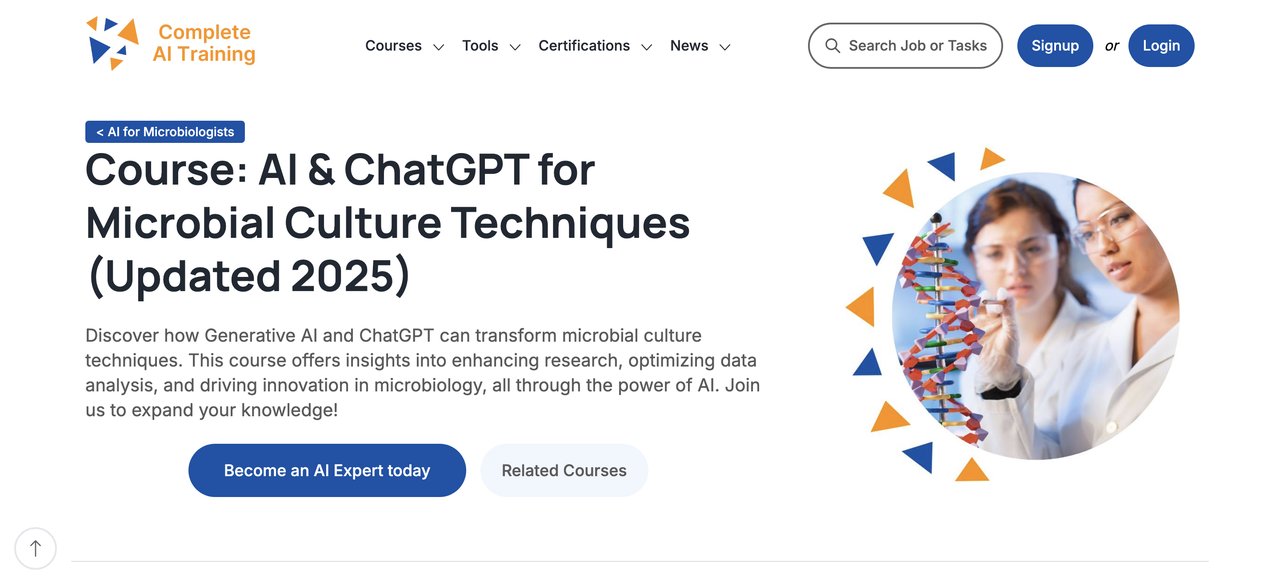
AI & ChatGPT for Microbial Culture Techniques focuses on using AI to enhance microbial culture processes. It covers various aspects such as media preparation, sterilization, and culture maintenance, providing practical applications for research and industry.
Key Topics Covered: Generative AI applications, automation, quality control, and troubleshooting in microbial culture.
Target Audience and Skill Level Requirements: Suitable for microbiologists interested in practical AI applications in culture techniques.
Pros:
- Comprehensive coverage of microbial culture processes.
- Practical applications and automation insights.
Cons:
- Requires membership for full access.
Who Would Benefit Most: Microbiologists looking to optimize culture techniques through AI.
Course 3: AI & ChatGPT for Microbial Genome Analysis
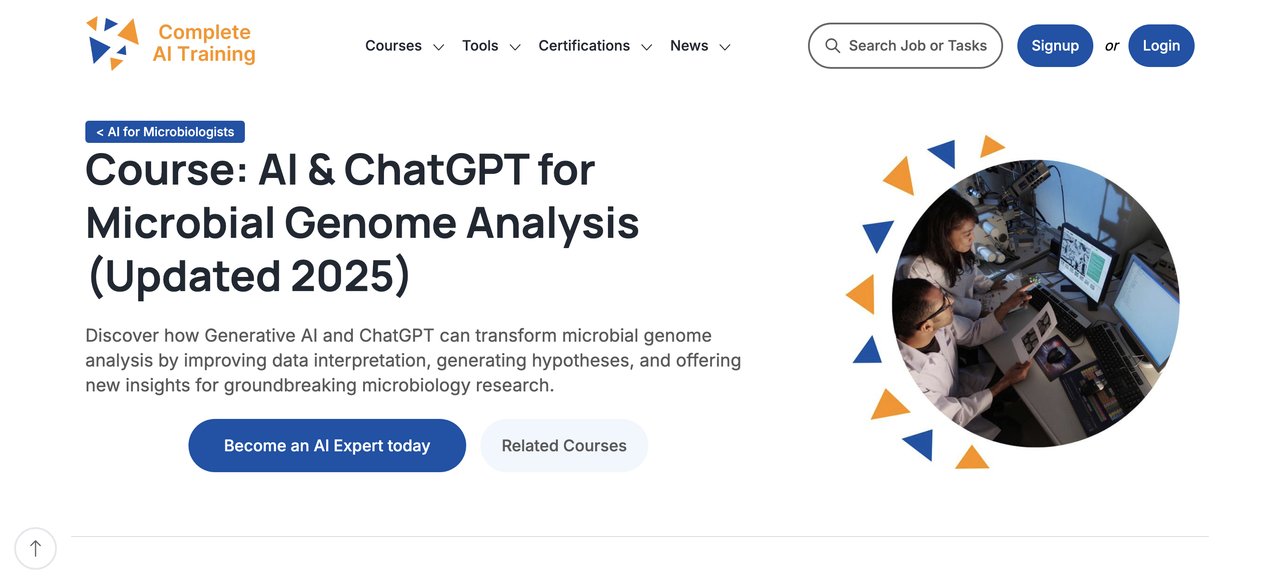
AI & ChatGPT for Microbial Genome Analysis is a beginner-level course focusing on utilizing AI for efficient microbial genome analysis. It emphasizes automating data interpretation and enhancing genomic studies.
Key Topics Covered: AI applications in genomics, data automation, and interpretation.
Target Audience and Skill Level Requirements: Beginners in microbiology or genomics seeking to apply AI in their research.
Pros:
- Tailored for microbiologists.
- Updated content for 2025.
Cons:
- Pricing details not specified upfront.
Who Would Benefit Most: Aspiring genomic researchers and microbiologists interested in AI-driven data analysis.
Course 4: AI & ChatGPT for Antibiotic Resistance Studies
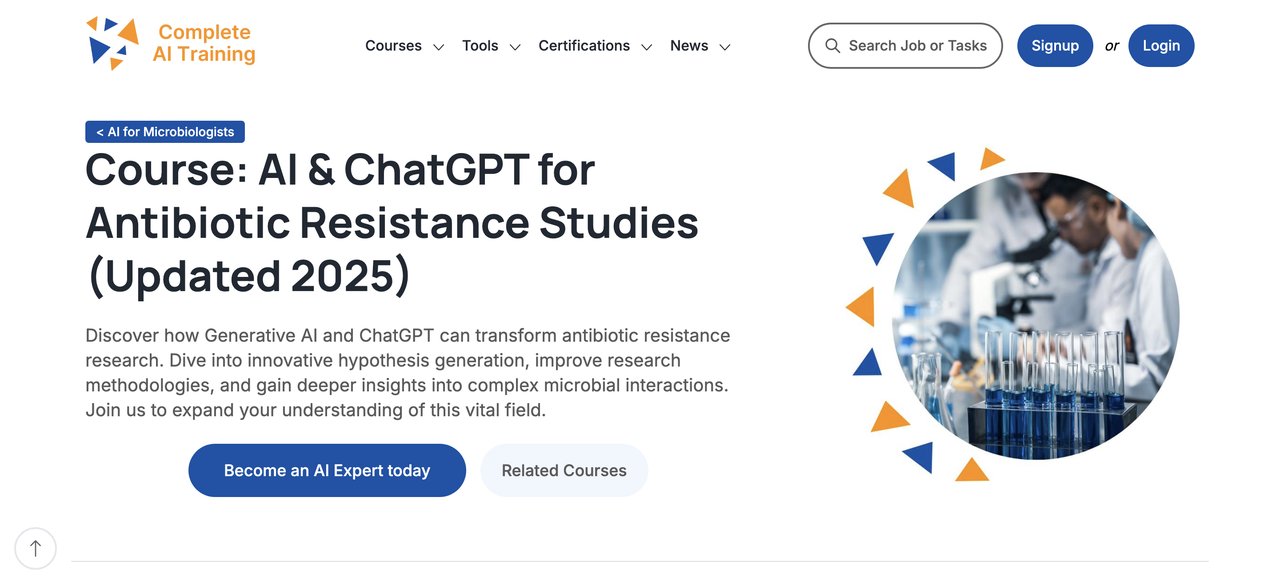
AI & ChatGPT for Antibiotic Resistance Studies offers an introduction to utilizing AI for studying antibiotic resistance patterns. This course accelerates research and hypothesis generation in this critical area of microbiology.
Key Topics Covered: AI tools for resistance pattern analysis, research acceleration, and hypothesis generation.
Target Audience and Skill Level Requirements: Ideal for beginners or professionals focusing on antibiotic resistance research.
Pros:
- Critical focus on antibiotic resistance.
- Beginner-friendly.
Cons:
- No explicit pricing details.
Who Would Benefit Most: Researchers and professionals dealing with antibiotic resistance challenges.
Course 5: AI & ChatGPT for Pathogen Identification
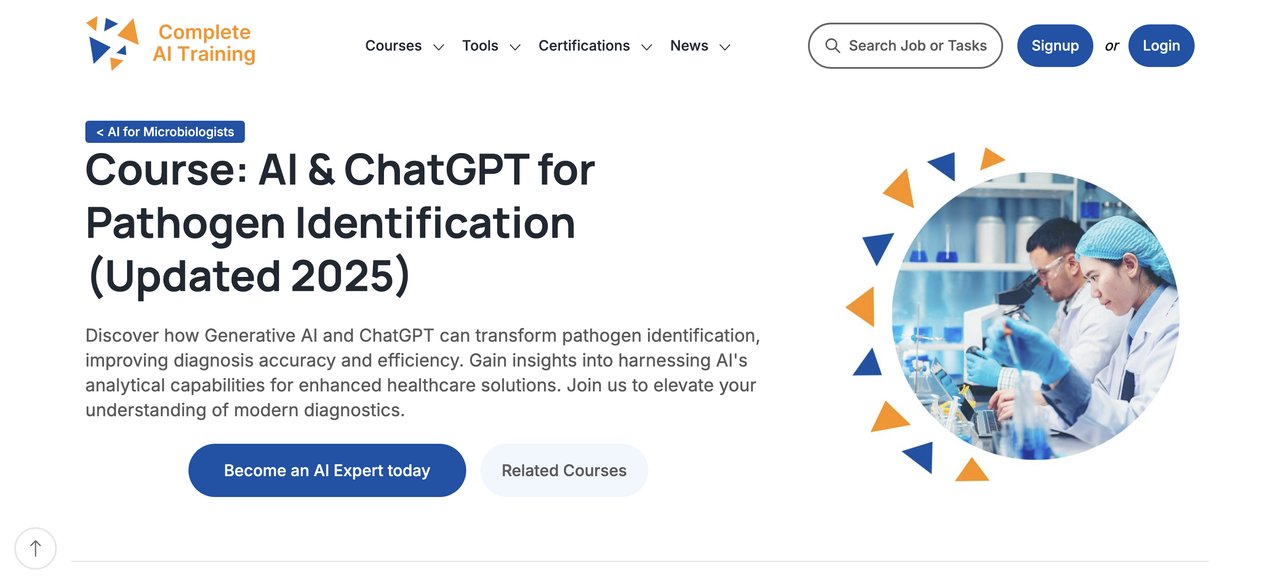
AI & ChatGPT for Pathogen Identification teaches AI applications in rapid and accurate pathogen identification, improving diagnostic workflows and research outcomes.
Key Topics Covered: AI-enhanced diagnostics, pathogen identification, and workflow enhancement.
Target Audience and Skill Level Requirements: Suitable for microbiologists involved in diagnostics and pathogen research.
Pros:
- Focus on practical microbiological diagnostics.
- Updated content.
Cons:
- No explicit pricing.
Who Would Benefit Most: Diagnostic professionals and researchers focusing on pathogen identification.
Course 6: AI & ChatGPT for Environmental Microbial Sampling
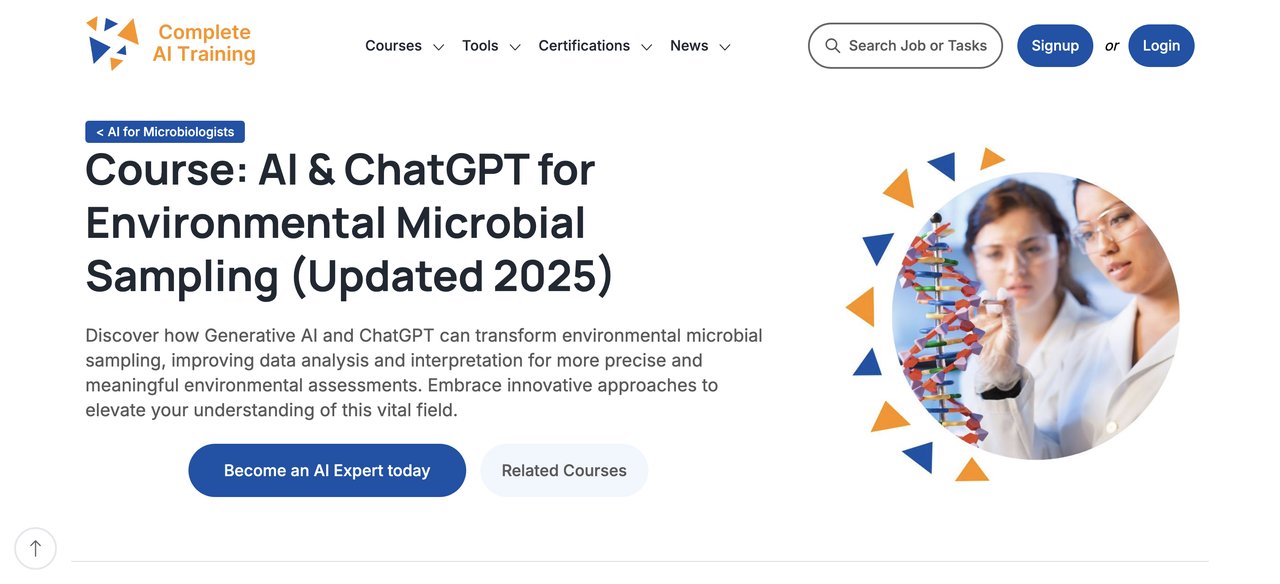
AI & ChatGPT for Environmental Microbial Sampling introduces AI applications for optimizing environmental microbial sampling strategies and data analysis.
Key Topics Covered: AI-driven sampling strategies, data analysis, and environmental microbiology.
Target Audience and Skill Level Requirements: Beginner-level course for environmental microbiologists.
Pros:
- Relevant to environmental microbiology.
- Practical AI integration.
Cons:
- Pricing not disclosed.
Who Would Benefit Most: Environmental microbiologists seeking to enhance sampling and analysis techniques with AI.
Course 7: AI & ChatGPT for Fermentation Process Optimization
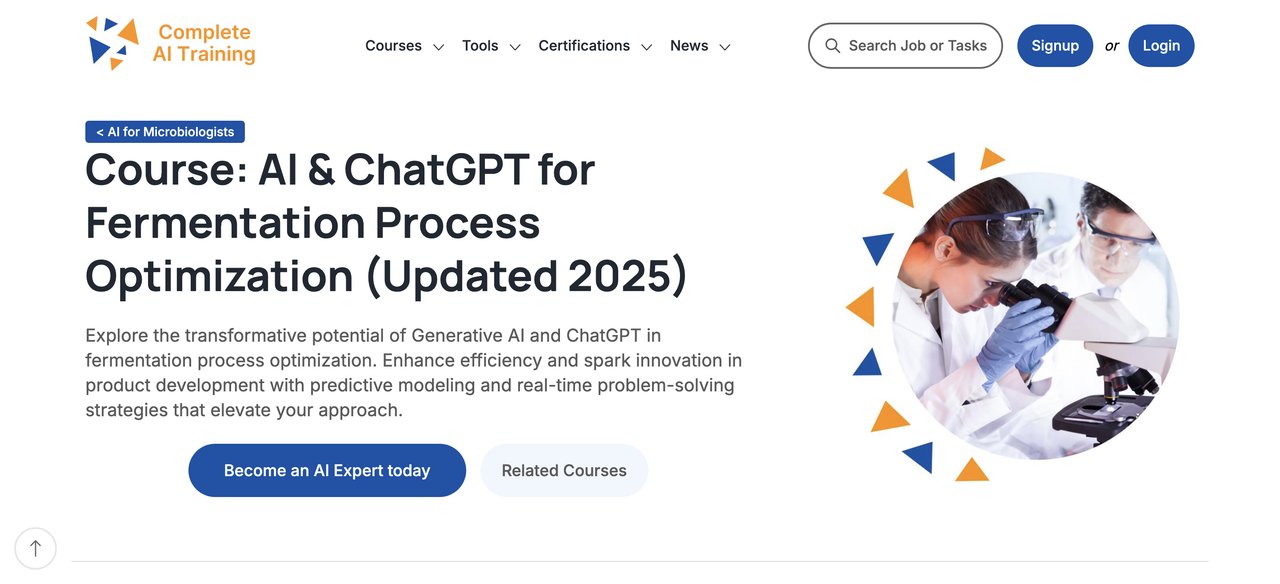
AI & ChatGPT for Fermentation Process Optimization is designed to optimize fermentation processes using AI, enhancing efficiency and yield through data insights.
Key Topics Covered: AI optimization techniques, efficiency improvement, and data-driven fermentation insights.
Target Audience and Skill Level Requirements: Industry professionals focused on fermentation processes.
Pros:
- Industry-relevant AI applications.
- Practical focus on efficiency.
Cons:
- No pricing information.
Who Would Benefit Most: Professionals in fermentation industries seeking AI-driven process enhancements.
Course 8: AI & ChatGPT for Microbial Ecology Analysis
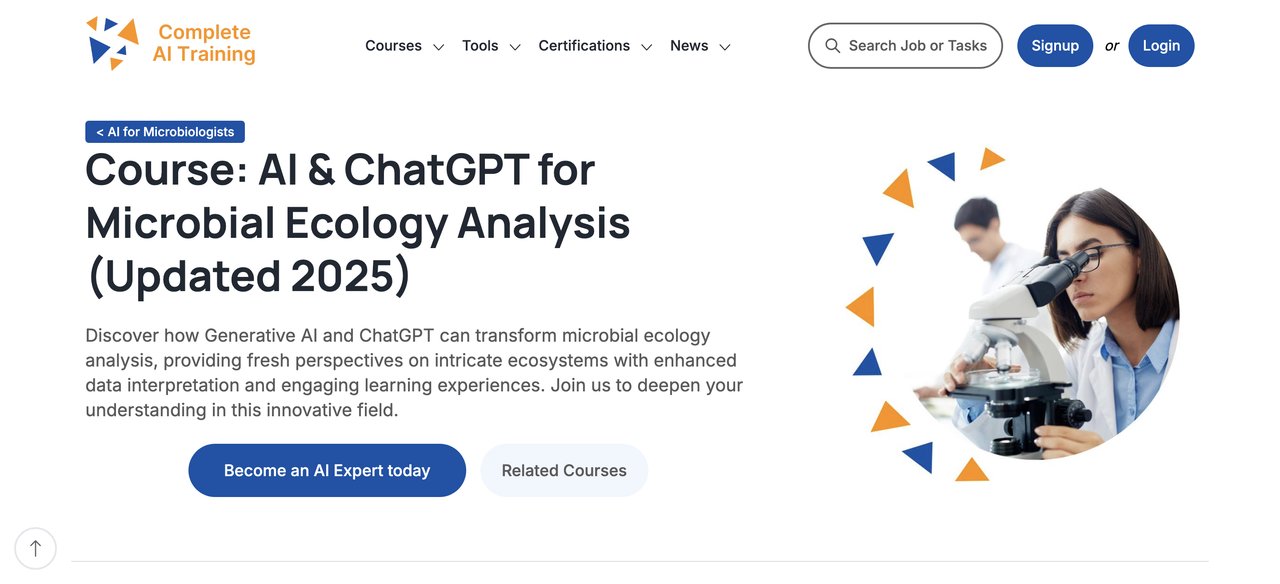
AI & ChatGPT for Microbial Ecology Analysis explores AI methods for analyzing microbial ecology data, facilitating deeper ecological insights and research productivity.
Key Topics Covered: AI applications in ecology, data analysis, and research productivity.
Target Audience and Skill Level Requirements: Beginner-level course for ecological microbiologists.
Pros:
- Tailored to ecological microbiology.
- Updated for 2025.
Cons:
- Pricing details unavailable.
Who Would Benefit Most: Ecological microbiologists interested in AI-enhanced data analysis.
Course 9: AI & ChatGPT for Clinical Trial Data Analysis
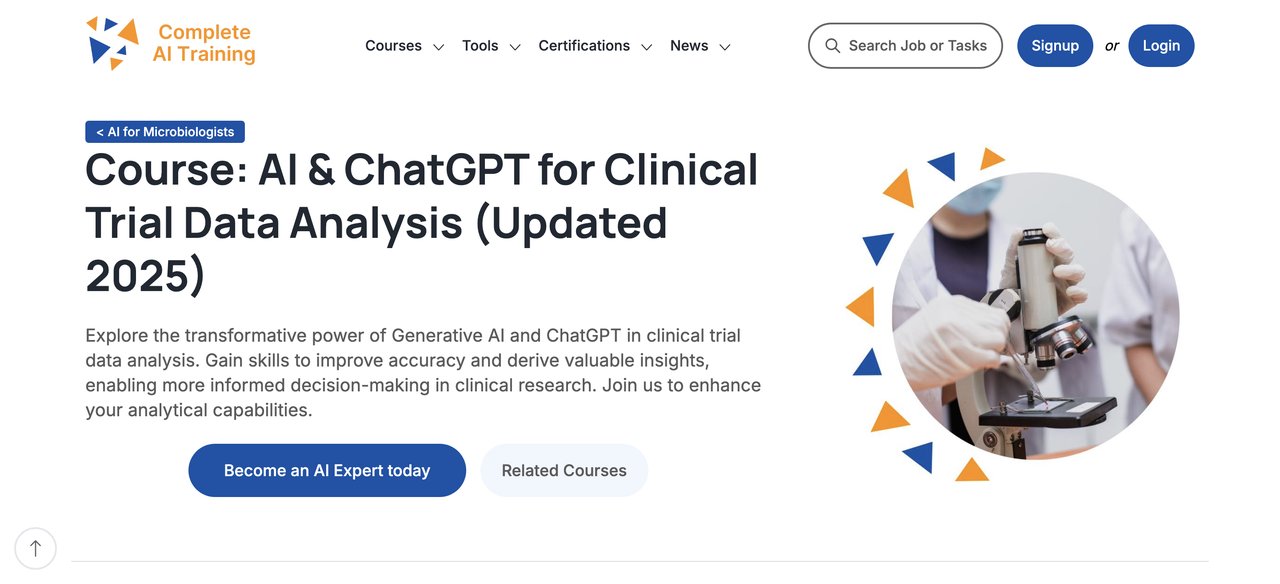
AI & ChatGPT for Clinical Trial Data Analysis covers AI's application in analyzing clinical trial data relevant to microbiology, improving research efficiency and data interpretation.
Key Topics Covered: AI in clinical trials, data analysis, and research efficiency.
Target Audience and Skill Level Requirements: Professionals engaged in clinical trial data management.
Pros:
- Specialized for clinical trial data.
- Enhances research efficiency.
Cons:
- Requires membership.
Who Would Benefit Most: Researchers and analysts working with clinical trial data in microbiology.
Course 10: AI & ChatGPT for Infection Control Strategies
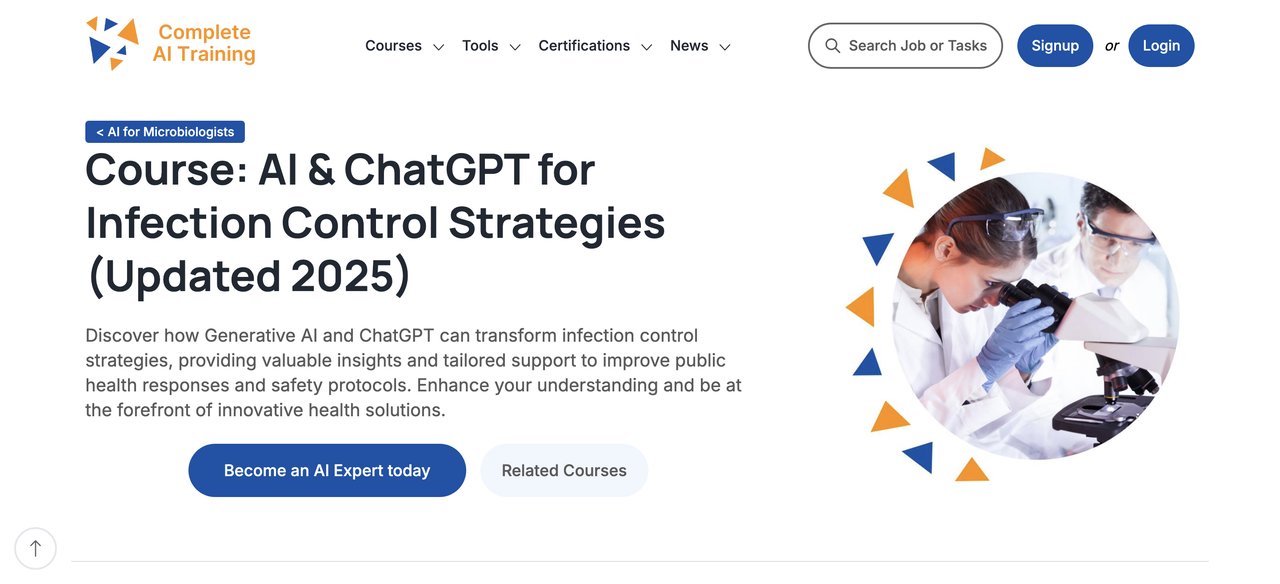
AI & ChatGPT for Infection Control Strategies focuses on using AI and ChatGPT to develop and optimize infection control strategies in microbiology settings.
Key Topics Covered: AI-driven strategy development, infection control, and optimization techniques.
Target Audience and Skill Level Requirements: Designed for microbiologists focused on infection control.
Pros:
- Practical for infection control.
- AI-driven strategy development.
Cons:
- Requires membership.
Who Would Benefit Most: Professionals involved in developing and implementing infection control strategies.
Course 11: AI & ChatGPT for Vaccine Development Research
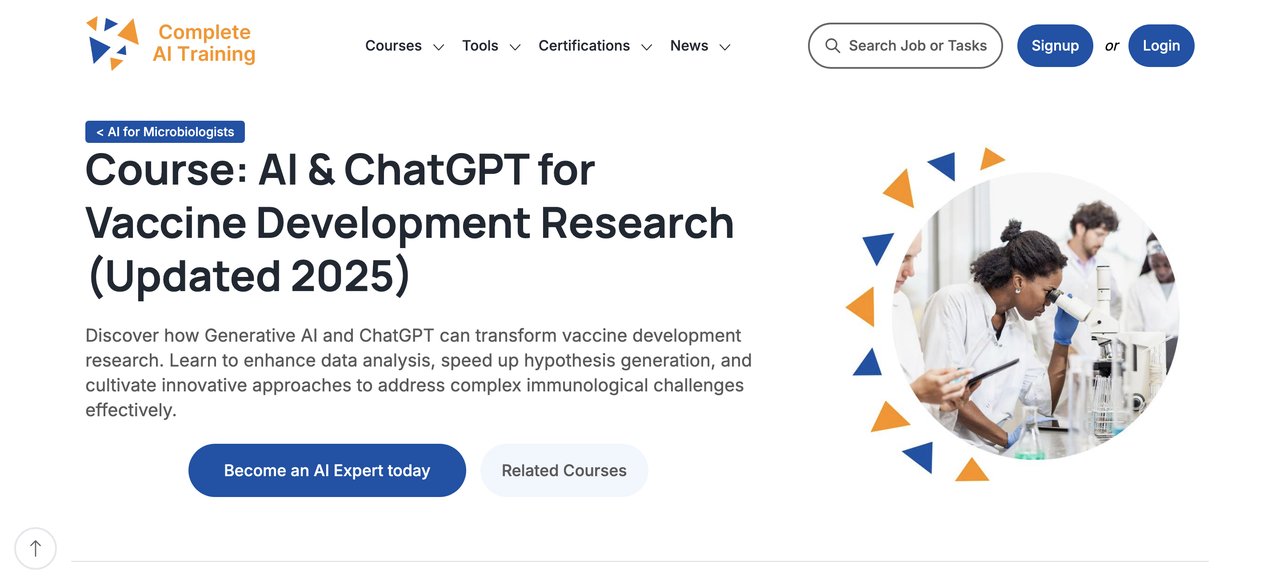
AI & ChatGPT for Vaccine Development Research covers the use of AI in vaccine research, from candidate identification to data analysis.
Key Topics Covered: AI in vaccine research, candidate identification, and data analysis.
Target Audience and Skill Level Requirements: Suitable for researchers in vaccine development.
Pros:
- Relevant to vaccine research.
- AI-driven insights.
Cons:
- Requires membership.
Who Would Benefit Most: Researchers in vaccine development seeking AI applications in their work.
Course 12: AI & ChatGPT for Bioremediation Strategies
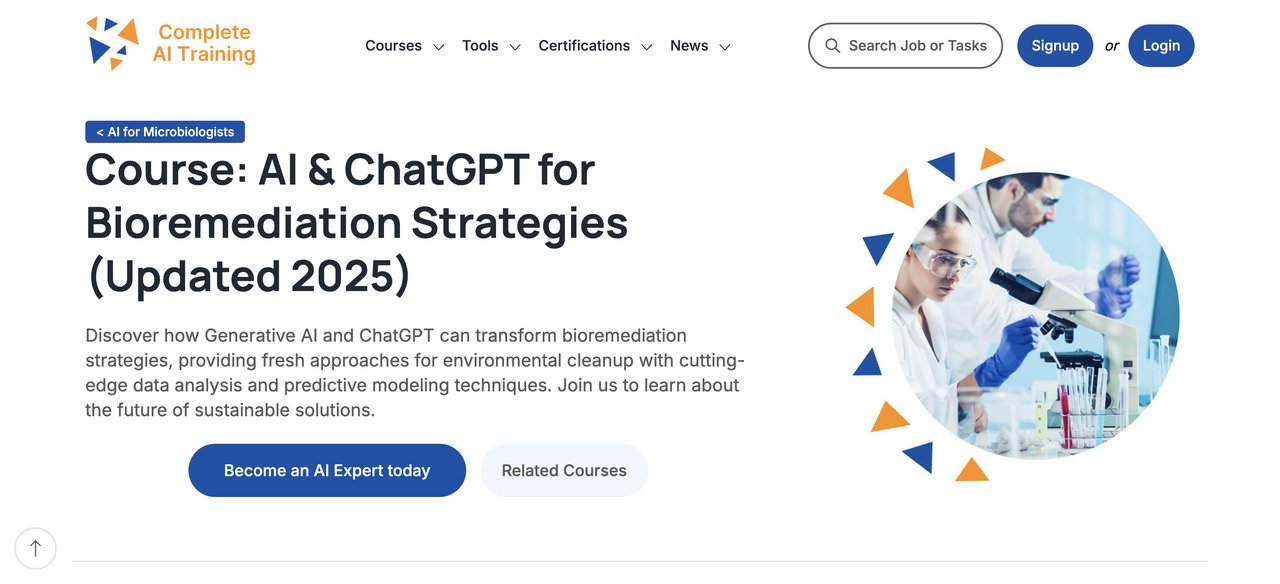
AI & ChatGPT for Bioremediation Strategies teaches the application of AI in developing and optimizing bioremediation strategies in environmental microbiology.
Key Topics Covered: AI applications in bioremediation, strategy development, and environmental microbiology.
Target Audience and Skill Level Requirements: Environmental microbiologists focused on bioremediation.
Pros:
- Focus on environmental applications.
- AI-driven optimization.
Cons:
- Requires membership.
Who Would Benefit Most: Environmental microbiologists involved in bioremediation projects.
Course 13: AI & ChatGPT for Probiotic and Prebiotic Research
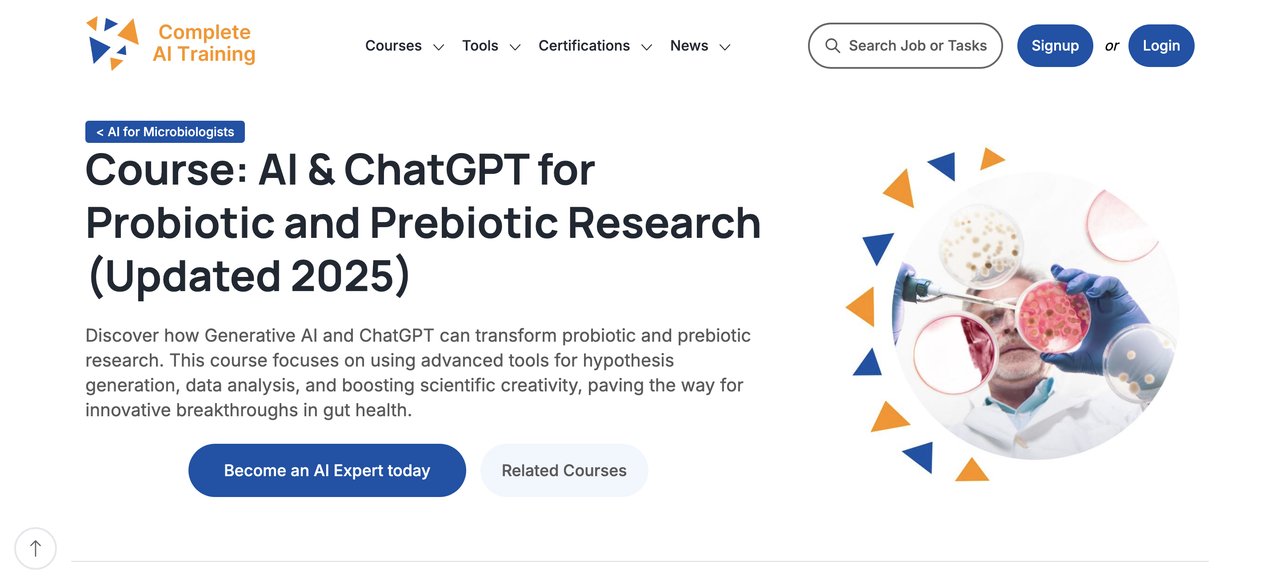
AI & ChatGPT for Probiotic and Prebiotic Research focuses on using AI in probiotic and prebiotic research, including data analysis and experimental design.
Key Topics Covered: AI-enhanced experimental design, data analysis, and probiotic/prebiotic research.
Target Audience and Skill Level Requirements: Researchers in the field of probiotics and prebiotics.
Pros:
- Specialized for probiotic/prebiotic research.
- AI-enhanced experimental design.
Cons:
- Requires membership.
Who Would Benefit Most: Researchers focused on probiotics and prebiotics seeking AI-driven methodologies.
Course 14: AI & ChatGPT for Microbial Genetics and Evolution
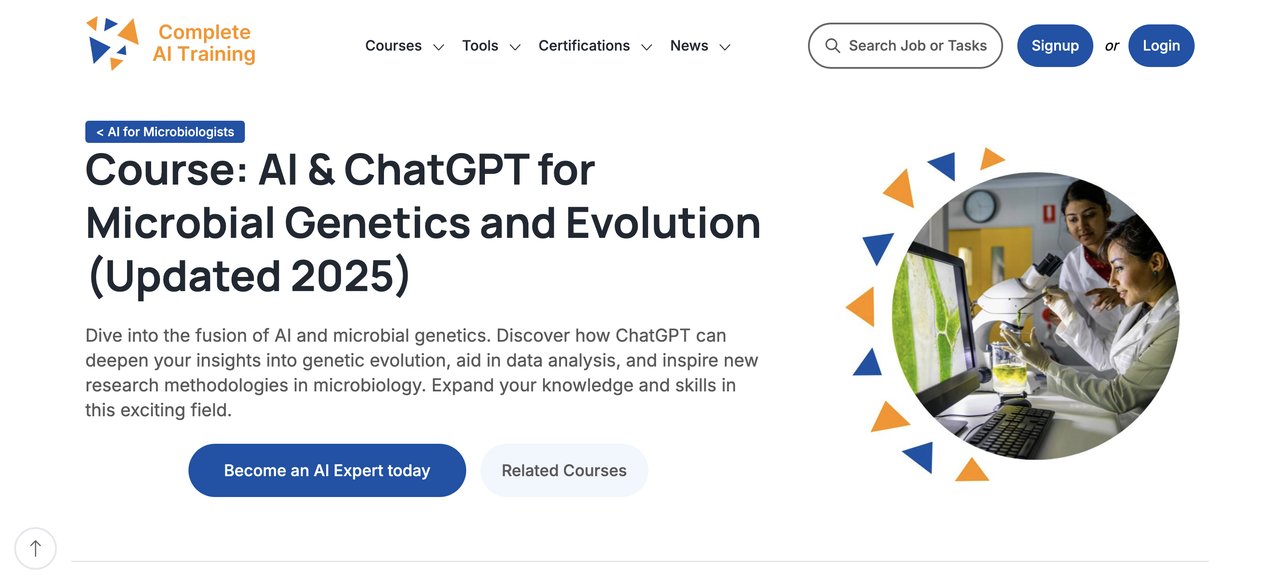
AI & ChatGPT for Microbial Genetics and Evolution covers AI applications in microbial genetics and evolutionary studies, including data analysis and hypothesis generation.
Key Topics Covered: AI in genetics and evolution, data analysis, and hypothesis generation.
Target Audience and Skill Level Requirements: Microbiologists interested in genetics and evolutionary studies.
Pros:
- Focus on genetics and evolution.
- AI-driven hypothesis generation.
Cons:
- Requires membership.
Who Would Benefit Most: Geneticists and evolutionary microbiologists seeking to incorporate AI into their research.
Course 15: AI & ChatGPT for Biofilm Formation and Analysis
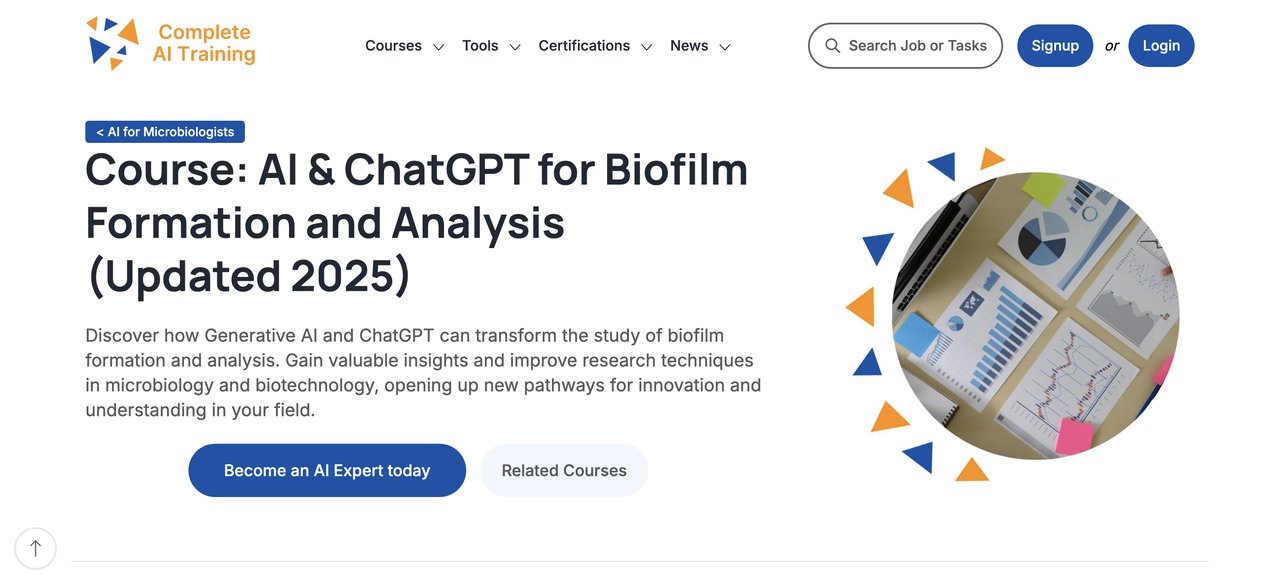
AI & ChatGPT for Biofilm Formation and Analysis teaches the use of AI in studying biofilm formation and analysis, enhancing research and experimental workflows.
Key Topics Covered: AI-enhanced biofilm research, formation, and analysis techniques.
Target Audience and Skill Level Requirements: Suitable for microbiologists specializing in biofilm research.
Pros:
- Specialized for biofilm research.
- AI-enhanced analysis.
Cons:
- Requires membership.
Who Would Benefit Most: Researchers and professionals working with biofilms in microbiology.
Course 16: AI & ChatGPT for Laboratory Safety and Protocol Design
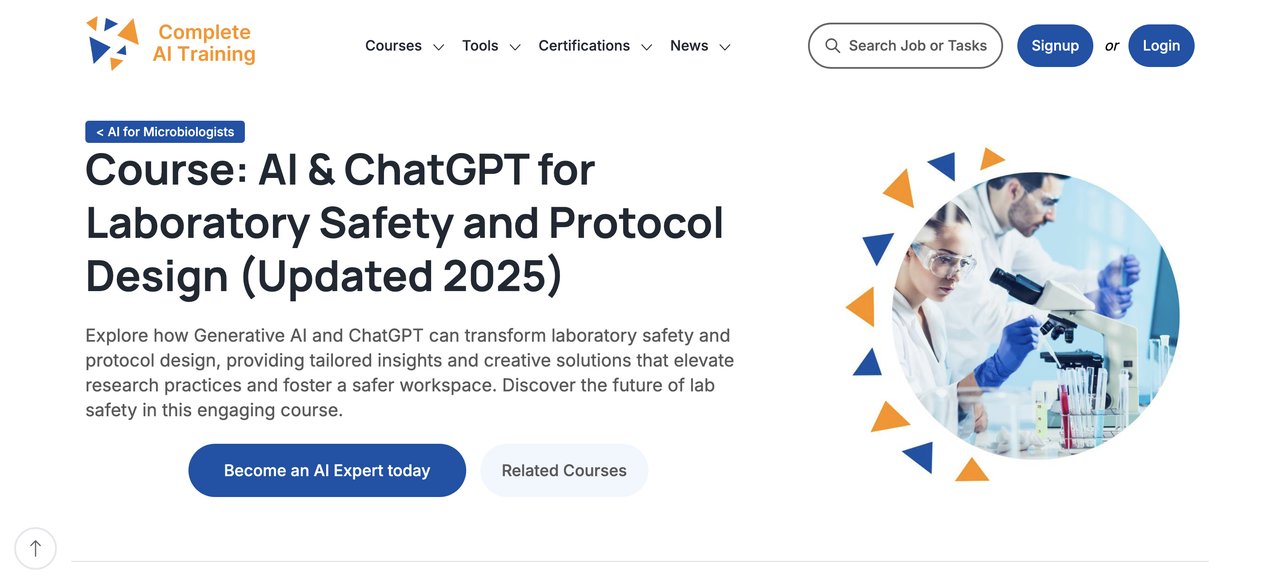
AI & ChatGPT for Laboratory Safety and Protocol Design covers the application of AI in designing laboratory safety protocols and optimizing lab workflows for microbiologists.
Key Topics Covered: AI-driven safety protocol design, lab workflow optimization, and microbiology applications.
Target Audience and Skill Level Requirements: Microbiologists responsible for lab safety and protocol development.
Pros:
- Focus on safety and protocol optimization.
- AI-driven workflow improvements.
Cons:
- Requires membership.
Who Would Benefit Most: Lab managers and microbiologists involved in safety and protocol optimization.
Course 17: AI Youth Camp 2025 , Bioinformatics Track
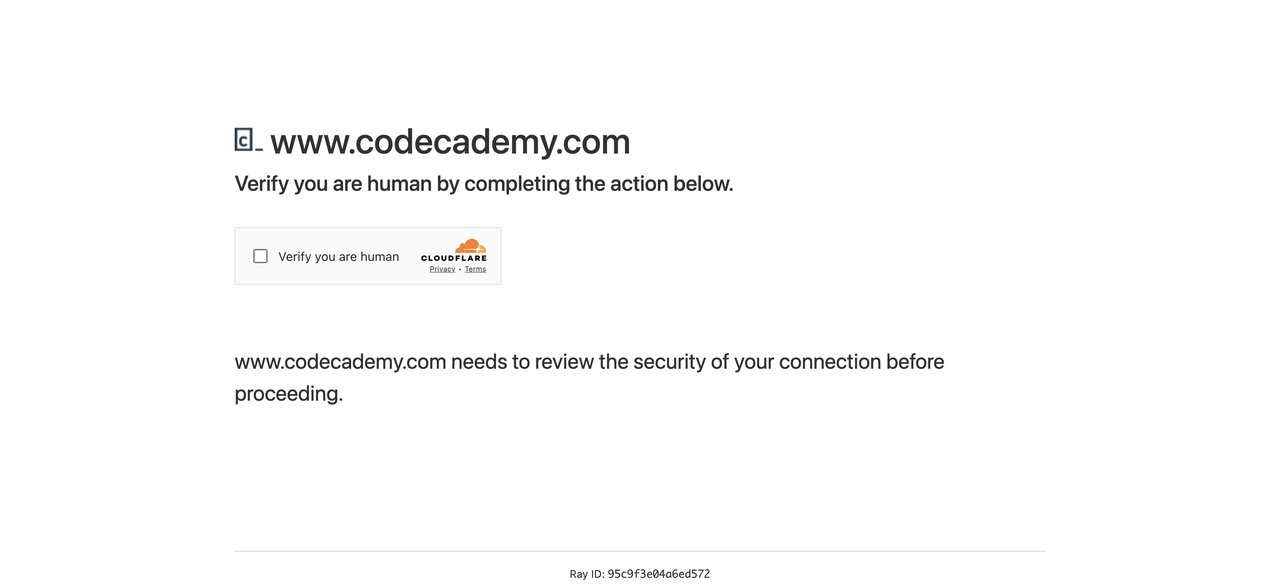
AI Youth Camp 2025 , Bioinformatics Track is a week-long immersive camp for ages 15-21, offering foundational and intermediate AI education with a concurrent bioinformatics session. It includes hands-on projects, a hackathon, and a data center visit.
Key Topics Covered: Python for AI, machine learning, deep learning, and bioinformatics projects.
Target Audience and Skill Level Requirements: Young microbiologists and students aged 15-21 interested in bioinformatics and AI.
Pros:
- Tailored bioinformatics AI track.
- Hands-on projects and hackathon.
- Inclusive pricing with accommodation and meals.
Cons:
- Age restriction may limit access for older professionals.
- Location-specific (Jakarta, Indonesia), may require travel.
Who Would Benefit Most: Young aspiring microbiologists and students interested in AI and bioinformatics.
Overall Recommendations for Microbiologists Seeking AI Courses
When selecting an AI course as a microbiologist, it's crucial to consider your specific needs and career objectives. CompleteAI Training offers a comprehensive and affordable solution for continuous learning and industry updates, making it ideal for professionals who value ongoing education and up-to-date resources.
For those interested in specific applications of AI in microbiology, options like the specialization courses offered by CompleteAI Training in pathogen identification, fermentation process optimization, and probiotic research provide targeted learning opportunities. Each course caters to different aspects of microbiology and may require membership for full access.
The AI Youth Camp 2025 , Bioinformatics Track is an excellent opportunity for younger individuals looking to delve into AI and bioinformatics with practical experience and expert guidance.
Ultimately, the best course will depend on your current expertise level, specific interests in microbiology, and how you plan to integrate AI into your professional activities. Consider the pros and cons, along with any logistical factors such as location and membership requirements, to make an informed decision that aligns with your career goals.




